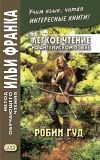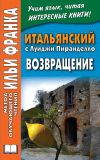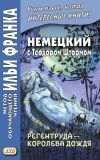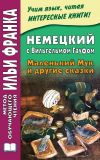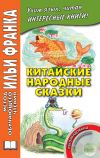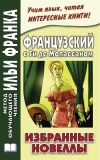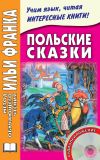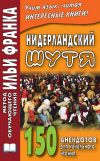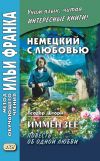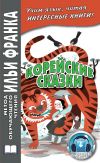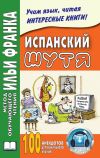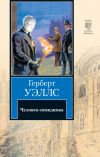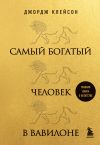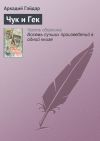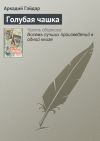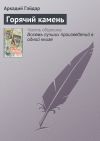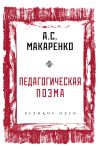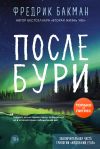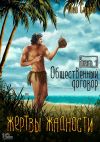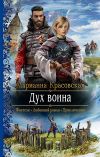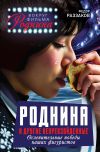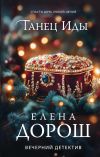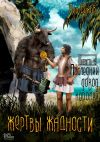Текст книги "Английская коллекция. Уильям Батлер Йейтс. Рассказы о Рыжем Ханрахане / W. B. Yeats. Stories of Red Hanrahan"
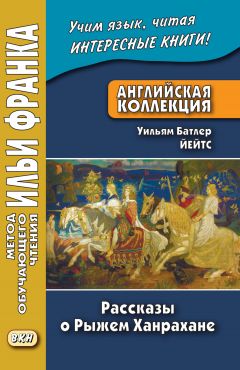
Автор книги: Уильям Йейтс
Жанр: Иностранные языки, Наука и Образование
Возрастные ограничения: +16
сообщить о неприемлемом содержимом
Текущая страница: 3 (всего у книги 9 страниц)
sure [ʃʋǝ], soreness ['sɔ:nǝs], half-door [,hɑ:f'dɔ:]
He knew by the shape of the hills and by the shining of Lough Greine in the distance that he was upon one of the hills of Slieve Echtge, but he was not sure how he came there; for all that had happened in the barn had gone from him, and all of his journey but the soreness of his feet and the stiffness in his bones.
It was a year after that, there were men of the village of Cappaghtagle sitting by the fire in a house on the roadside, and Red Hanrahan that was now very thin and worn and his hair very long and wild, came to the half-door and asked leave to come in and rest himself;
and they bid him welcome because it was Samhain night (и они оказали ему гостеприимство, поскольку была ночь Самайна). He sat down with them (он уселся с ними), and they gave him a glass of whiskey out of a quart bottle (и они дали = налили ему стакан виски из бутыли емкостью в кварту); and they saw the little inkpot hanging about his neck (они увидели маленькую чернильницу, висящую у него на шее), and knew he was a scholar (и поняли, что он – ученый), and asked for stories about the Greeks (и попросили его /рассказать/ истории про греков).
He took the Virgil out of the big pocket of his coat (он достал /том/ Вергилия из большого кармана своей куртки; to take out – вынимать), but the cover was very black and swollen with the wet (но переплет был очень грязным и разбухшим от сырости; cover – покрышка, обертка; переплет, обложка; black – черный; грязный), and the page when he opened it was very yellow (а страница, когда он открыл ее, оказалась весьма пожелтевшей), but that was no great matter (но это не имело большого значения; no matter – неважно, не имеет значения; matter – материал, вещество; дело, вопрос), for he looked at it like a man that had never learned to read (потому что он смотрел на нее как человек, который никогда не учился читать).
because [bɪ'kɒz], whiskey ['wɪskɪ], scholar ['skɒlǝ]
and they bid him welcome because it was Samhain night. He sat down with them, and they gave him a glass of whiskey out of a quart bottle; and they saw the little inkpot hanging about his neck, and knew he was a scholar, and asked for stories about the Greeks.
He took the Virgil out of the big pocket of his coat, but the cover was very black and swollen with the wet, and the page when he opened it was very yellow, but that was no great matter, for he looked at it like a man that had never learned to read.
Some young man that was there began to laugh at him then (тут какой-то молодой парень, который был там, начал смеяться над ним), and to ask why did he carry so heavy a book with him (и спросил, зачем он носит с собой такую тяжелую книгу) when he was not able to read it (если не способен прочитать ее).
It vexed Hanrahan to hear that, and he put the Virgil back in his pocket (Ханрахан рассердился, услышав это, и убрал Вергилия назад в карман) and asked if they had a pack of cards among them (и спросил, есть ли у них: «среди них» колода карт), for cards were better than books (поскольку карты лучше, чем книги). When they brought out the cards he took them and began to shuffle them (когда достали карты, он взял их и начал тасовать), and while he was shuffling them something seemed to come into his mind (и пока он их тасовал, что-то, похоже, пришло ему на ум; to seem – казаться), and he put his hand to his face like one that is trying to remember, and he said (и он закрыл лицо рукой: «положил свою руку на свое лицо», как человек, который пытается /что-то/ вспомнить, и сказал; one – единица /цифра/; человек):
able ['eɪbl], shuffle ['ʃʌf(ǝ)l], mind [maɪnd]
Some young man that was there began to laugh at him then, and to ask why did he carry so heavy a book with him when he was not able to read it.
It vexed Hanrahan to hear that, and he put the Virgil back in his pocket and asked if they had a pack of cards among them, for cards were better than books. When they brought out the cards he took them and began to shuffle them, and while he was shuffling them something seemed to come into his mind, and he put his hand to his face like one that is trying to remember, and he said:
“Was I ever here before, or where was I on a night like this (бывал ли я здесь когда-то раньше, и где я был в ночь, похожую на эту)?” and then of a sudden he stood up and let the cards fall to the floor, and he said (и тут вдруг он вскочил, позволив картам упасть на пол = уронив карты на пол, и сказал), “Who was it brought me a message from Mary Lavelle (кто принес мне послание от Мэри Лэвелл)?”
“We never saw you before now, and we never heard of Mary Lavelle (мы никогда не видели тебя прежде и никогда не слыхали о Мэри Лэвелл; before now – до сих пор),” said the man of the house (сказал хозяин дома). “And who is she,” he said (а кто она такая, – сказал = спросил он), “and what is it you are talking about (и о чем таком ты говоришь)?”
sudden ['sʌdn], floor [flɔ:], talk [tɔ:k]
”Was I ever here before, or where was I on a night like this?” and then of a sudden he stood up and let the cards fall to the floor, and he said, “Who was it brought me a message from Mary Lavelle?”
”We never saw you before now, and we never heard of Mary Lavelle,” said the man of the house. “And who is she,” he said, “and what is it you are talking about?”
“It was this night a year ago, I was in a barn (это было в эту ночь год назад, я был в амбаре), and there were men playing cards, and there was money on the table (парни играли в карты, на столе лежали деньги), they were pushing it from one to another here and there (они двигали их от одного к другому, туда и сюда; here and there – там и сям, туда и сюда: «здесь и там») – and I got a message, and I was going out of the door (я получил послание и выходил за дверь) to look for my sweetheart that wanted me, Mary Lavelle (чтоб отыскать свою возлюбленную, которая нуждалась во мне, Мэри Лэвелл; to look for – искать /кого-л., что-л./).” And then Hanrahan called out very loud (и тут Ханрахан выкрикнул очень громко): “Where have I been since then (где же я был с тех пор)? Where was I for the whole year (где я пробыл целый год)?”
year [jɪǝ, jɜ:], want [wɒnt], loud [laʋd]
“It was this night a year ago, I was in a barn, and there were men playing cards, and there was money on the table, they were pushing it from one to another here and there – and I got a message, and I was going out of the door to look for my sweetheart that wanted me, Mary Lavelle.” And then Hanrahan called out very loud: “Where have I been since then? Where was I for the whole year?”
“It is hard to say where you might have been in that time (трудно сказать, где ты мог побывать за это время),” said the oldest of the men (сказал старший из мужчин), “or what part of the world you may have travelled (или в какой части мира ты мог путешествовать); and it is like enough you have the dust of many roads on your feet (и очень похоже, что у тебя на ногах пыль множества дорог; enough – достаточно; весьма, довольно /усил./); for there are many go wandering and forgetting like that,” he said (ибо многие ходят странствовать и точно так же /обо всем/ забывают; like that – подобным образом), “when once they have been given the touch (ежели однажды их пометят: «к ним прикоснутся»;to give – давать; в сочетании с последующим существительным выражает действие, соответствующее значению существительного; touch – прикосновение; общение, контакт).”
”That is true,” said another of the men (это правда, – сказал другой «из этих мужчин»). “I knew a woman went wandering like that (я знал одну женщину, которая тоже так скиталась) through the length of seven years (на протяжении семи лет; length – длина; длительность, продолжительность);
might [maɪt], wander ['wɒndǝ], true [tru:]
“It is hard to say where you might have been in that time,” said the oldest of the men, “or what part of the world you may have travelled; and it is like enough you have the dust of many roads on your feet; for there are many go wandering and forgetting like that,” he said, “when once they have been given the touch.”
”That is true,” said another of the men. “I knew a woman went wandering like that through the length of seven years;
she came back after (после она вернулась), and she told her friends she had often been glad enough (и рассказывала своим друзьям, что часто была очень рада) to eat the food that was put in the pig’s trough (есть пищу, которую положили в свиное корыто). And it is best for you to go to the priest now,” he said (лучшее для тебя сейчас – это пойти к священнику, – сказал он), “and let him take off you whatever may have been put upon you (и пусть он снимет с тебя все, что, возможно, было на тебя наложено; to take off – удалять, снимать).”
“It is to my sweetheart I will go, to Mary Lavelle,” said Hanrahan (к своей любимой я пойду, к Мэри Лэвелл, – сказал Ханрахан); “it is too long I have delayed (слишком долго я медлил), how do I know what might have happened to her in the length of a year (откуда мне знать, что могло случиться с нею за год)?”
trough [trɒf], priest [pri:st], whatever [wɒt'evǝ]
she came back after, and she told her friends she had often been glad enough to eat the food that was put in the pig’s trough. And it is best for you to go to the priest now,” he said, “and let him take off you whatever may have been put upon you.”
“It is to my sweetheart I will go, to Mary Lavelle,” said Hanrahan; “it is too long I have delayed, how do I know what might have happened to her in the length of a year?”
He was going out of the door then (затем он пошел за дверь), but they all told him it was best for him to stop the night (но они все сказали ему, что для него лучше будет остановиться = остаться на ночь), and to get strength for the journey (и набраться сил для путешествия); and indeed he wanted that, for he was very weak (и ему действительно это было нужно, потому что он был очень слаб), and when they gave him food (и когда они дали ему еду) he ate it like a man that had never seen food before (он ел как человек, который никогда не видел еды раньше), and one of them said, “He is eating as if he had trodden on the hungry grass (и один из них сказал: «Он ест так, будто до этого пасся на скудной травке»; to tread – ступать, шагать; топтать; hungry – голодный; скудный /о пище/).” It was in the white light of the morning he set out (уже при белом свете утра он отправился в путь; to set out – отправляться /в путешествие/), and the time seemed long to him till he could get to Mary Lavelle’s house (и время, казалось, долго /текло/ для него, покуда он не добрался до дома Мэри Лэвелл; to get /зд./ – добираться /до какого-л. места/).
all [ɔ:l], hungry ['hʌŋɡrɪ], grass [ɡrɑ:s]
He was going out of the door then, but they all told him it was best for him to stop the night, and to get strength for the journey; and indeed he wanted that, for he was very weak, and when they gave him food he ate it like a man that had never seen food before, and one of them said, “He is eating as if he had trodden on the hungry grass.” It was in the white light of the morning he set out, and the time seemed long to him till he could get to Mary Lavelle’s house.
But when he came to it, he found the door broken (но когда он подошел к нему, то обнаружил, что дверь сломана; to break), and the thatch dropping from the roof (солома свисает с кровли; to drop – капать, стекать каплями; падать, вываливаться), and no living person to be seen (и не видно ни одного живого человека). And when he asked the neighbours what had happened to her (а когда он расспросил соседей, что же случилось с ней), all they could say was that she had been put out of the house (все, что они смогли рассказать, это то, что ее выгнали из дома; to put out – выгонять, устранять), and had married some labouring man (и /что она/ вышла замуж за какого-то рабочего парня), and they had gone looking for work to London or Liverpool or some big place (и они уехали искать работу то ли в Лондон, то ли в Ливерпуль, то ли в какой-то другой большой город; place – место; местечко, город). And whether she found a worse place or a better he never knew (но нашла ли она худшее место или лучшее, он так никогда и не узнал), but anyway he never met with her or with news of her again (но, как бы то ни было, он никогда не встречался с нею и больше /не получал/ от нее вестей: «или /не встречался/ с вестями о ней»;to meet – встречать/ся/; again – снова, вновь).
person ['pɜ:sn], labouring ['leɪbǝrɪŋ], London ['lʌndǝn]
But when he came to it, he found the door broken, and the thatch dropping from the roof, and no living person to be seen. And when he asked the neighbours what had happened to her, all they could say was that she had been put out of the house, and had married some labouring man, and they had gone looking for work to London or Liverpool or some big place. And whether she found a worse place or a better he never knew, but anyway he never met with her or with news of her again.
The twisting of the rope
(Плетение веревки[1]1
To twist – крутить, скручивать; плести.
[Закрыть])
Hanrahan was walking the roads one time near Kinvara at the fall of day (однажды: «один раз» Ханрахан шел по дороге неподалеку от Кинвары под конец дня; fall – падение; убывание), and he heard the sound of a fiddle from a house a little way off the roadside (и услышал звуки скрипки из дома, стоявшего немного в стороне от дороги). He turned up the path to it (он свернул на тропку, /ведущую/ к нему), for he never had the habit of passing by any place (поскольку никогда не имел привычки проходить мимо любого места) where there was music or dancing or good company (где есть музыка, танцы или хорошая компания), without going in (без того, чтобы зайти внутрь = не заходя туда). The man of the house was standing at the door (хозяин дома стоял у двери), and when Hanrahan came near he knew him and he said (и, когда Ханрахан подошел ближе, узнал его и сказал): “A welcome before you, Hanrahan, you have been lost to us this long time (добро пожаловать: «гостеприимство перед тобой», Ханрахан, ты был потерян для нас столь долгое время; to lose).”
path [pɑ:θ], company ['kʌmp(ǝ)nɪ], knew [nju:]
Hanrahan was walking the roads one time near Kinvara at the fall of day, and he heard the sound of a fiddle from a house a little way off the roadside. He turned up the path to it, for he never had the habit of passing by any place where there was music or dancing or good company, without going in. The man of the house was standing at the door, and when Hanrahan came near he knew him and he said: “A welcome before you, Hanrahan, you have been lost to us this long time.”
But the woman of the house came to the door and she said to her husband (но хозяйка дома подошла к двери и сказала своему мужу): “I would be as well pleased for Hanrahan not to come in tonight (мне бы больше понравилось, если бы Ханрахан не входил /к нам/ сегодня вечером;as well – желательно, лучше; pleased – довольный), for he has no good name now among the priests (потому что теперь он имеет недобрую славу у священников; name – имя, название; репутация, слава), or with women that mind themselves (или у женщин, которых заботит их репутация: «которые заботятся о себе»; to mind – заботиться, тревожиться), and I wouldn’t wonder from his walk if he has a drop of drink taken (и я не удивлюсь, /судя/ по его походке, что он уже выпил глоток спиртного; drop – капля; глоток спиртного).” But the man said (но хозяин сказал), “I will never turn away Hanrahan of the poets from my door (я никогда не прогоню Ханрахана-поэта: «Ханрахана из поэтов» от своей двери; to turn away – прогонять: «разворачивать прочь»),” and with that he bade him enter (и с этими /словами/ он попросил его войти; to bid).
husband ['hʌzbǝnd], walk [wɔ:k], poet ['pǝʋɪt]
But the woman of the house came to the door and she said to her husband: “I would be as well pleased for Hanrahan not to come in tonight, for he has no good name now among the priests, or with women that mind themselves, and I wouldn’t wonder from his walk if he has a drop of drink taken.” But the man said, “I will never turn away Hanrahan of the poets from my door,” and with that he bade him enter.
There were a good many neighbours gathered in the house (в доме собралось много соседей; a good many – довольно много, порядочное количество), and some of them remembered Hanrahan (и некоторые из них помнили Ханрахана); but some of the little lads that were in the corners had only heard of him (но некоторые из молодых парней, сидевших в углу, только лишь слышали о нем), and they stood up to have a view of him (и они встали, чтобы рассмотреть его; view – осмотр), and one of them said (и один из них сказал): “Is not that Hanrahan that had the school (а не тот ли это Ханрахан, у которого была школа), and that was brought away by Them (и которого унесли Они)?” But his mother put her hand over his mouth and bade him be quiet (но его мать прикрыла ему рот рукой и попросила умолкнуть: «быть тихим»), and not be saying things like that (и не говорить подобные вещи). “For Hanrahan is apt to grow wicked,” she said (потому что Ханрахан может разозлиться, – сказала она; apt – склонный; очень способный; вероятный, возможный; to grow – расти, вырастать; становиться), “if he hears talk of that story, or if anyone goes questioning him (если он услышит болтовню о той истории, или если кто-нибудь станет расспрашивать его /об этом/).”
gather ['ɡæðǝ], view [vju:], brought [brɔ:t]
There were a good many neighbours gathered in the house, and some of them remembered Hanrahan; but some of the little lads that were in the corners had only heard of him, and they stood up to have a view of him, and one of them said: “Is not that Hanrahan that had the school, and that was brought away by Them?” But his mother put her hand over his mouth and bade him be quiet, and not be saying things like that. “For Hanrahan is apt to grow wicked,” she said, “if he hears talk of that story, or if anyone goes questioning him.”
One or another called out then, asking him for a song (тут кто-то окликнул его: «выкрикнул» и попросил песню; one or another – тот или иной; кто-то), but the man of the house said it was no time to ask him for a song (но хозяин дома сказал, что не время просить его о песне), before he had rested himself (пока он не отдохнет); and he gave him whiskey in a glass (и он дал ему = Ханрахану виски в стакане), and Hanrahan thanked him and wished him good health and drank it off (и Ханрахан поблагодарил его, пожелал ему доброго здоровья и залпом выпил; to drink off – выпить до дна, залпом).
The fiddler was tuning his fiddle for another dance (скрипач настраивал скрипку для следующего танца), and the man of the house said to the young men (и хозяин дома сказал юношам), they would all know what dancing was like when they saw Hanrahan dance (что они все поймут, что такое танец: «на что танец похож», когда увидят, как танцует Ханрахан), for the like of it had never been seen since he was there before (ибо ничего подобного /никто/ не видывал с тех пор, как Ханрахан был здесь прежде; never – никогда; нисколько, никоим образом /эмоц. – усил./). Hanrahan said he would not dance (Ханрахан сказал, что не будет танцевать), he had better use for his feet now (что у него сейчас есть лучшее применение своим ногам), travelling as he was through the five provinces of Ireland (поскольку он путешествует: «путешествующий как он был» через пять провинций Ирландии).
glass [ɡlɑ:s], dance [dɑ:ns], Ireland ['aɪǝlǝnd]
One or another called out then, asking him for a song, but the man of the house said it was no time to ask him for a song, before he had rested himself; and he gave him whiskey in a glass, and Hanrahan thanked him and wished him good health and drank it off.
The fiddler was tuning his fiddle for another dance, and the man of the house said to the young men, they would all know what dancing was like when they saw Hanrahan dance, for the like of it had never been seen since he was there before. Hanrahan said he would not dance, he had better use for his feet now, travelling as he was through the five provinces of Ireland.
Just as he said that, there came in at the half-door Oona, the daughter of the house (только он сказал это, как в двустворчатую дверь вошла Уна, дочь /хозяев/ дома), having a few bits of bog deal from Connemara in her arms for the fire (неся: «имея» в руках несколько кусков торфа из Коннемары, чтоб подложить в огонь: «для огня»; bog deal – сосновое дерево, сохранившееся в торфянике). She threw them on the hearth (она бросила их в очаг; to throw) and the flame rose up, and showed her to be very comely and smiling (и пламя поднялось вверх, показав, что она очень хорошенькая и улыбчивая), and two or three of the young men rose up and asked for a dance (и /тогда/ несколько молодых людей поднялись и пригласили /ее/ танцевать; two or three – два-три, несколько; to ask – спрашивать; приглашать). But Hanrahan crossed the floor and brushed the others away (но Ханрахан пересек помост, оттеснил остальных; floor – пол, настил; танцплощадка; to brush away – отметать, отстранять; to brush – чистить щеткой; смахивать пыль, мусор), and said it was with him she must dance (и сказал, что только с ним она должна танцевать), after the long road he had travelled before he came to her (после долгой дороги, которую он проделал, прежде чем придти к ней; to travel – путешествовать; передвигаться).
threw [θru:], ask [ɑ:sk], brush [brʌʃ]
Just as he said that, there came in at the half-door Oona, the daughter of the house, having a few bits of bog deal from Connemara in her arms for the fire. She threw them on the hearth and the flame rose up, and showed her to be very comely and smiling, and two or three of the young men rose up and asked for a dance. But Hanrahan crossed the floor and brushed the others away, and said it was with him she must dance, after the long road he had travelled before he came to her.
And it is likely he said some soft word in her ear (и, вероятно, он сказал = шепнул ей на ушко какое-то ласковое слово; soft – мягкий; нежный, ласковый), for she said nothing against it, and stood out with him (потому что она не сказала ничего против этого, отошла с ним в сторонку; to stand out – отходить в сторону: «встать наружу»), and there were little blushes in her cheeks (и на ее щеках появился легкий: «маленький» румянец). Then other couples stood up (тут остальные пары встали), but when the dance was going to begin, Hanrahan chanced to look down (но когда танец уже должен был начаться, Ханрахан случайно глянул вниз; to chance – случайно произойти), and he took notice of his boots that were worn and broken (и увидел свои башмаки, которые были изношены и порваны; to take notice – обращать внимание; notice – извещение; наблюдение; to break – ломать; разрывать, прорывать), and the ragged grey socks showing through them (и драные серые носки, видневшиеся сквозь них; to show – показывать; показываться, виднеться);
ear [ɪǝ], chance [tʃɑ:ns], couple ['kʌp(ǝ)l]
And it is likely he said some soft word in her ear, for she said nothing against it, and stood out with him, and there were little blushes in her cheeks. Then other couples stood up, but when the dance was going to begin, Hanrahan chanced to look down, and he took notice of his boots that were worn and broken, and the ragged grey socks showing through them;
and he said angrily it was a bad floor, and the music no great things (и сказал сердито, что помост для танцев плох, а музыка – так себе; no great things – ничего особенного: «не великие вещи»), and he sat down in the dark place beside the hearth (и уселся в темном месте у очага). But if he did, the girl sat down there with him (но когда: «если = хотя» он так сделал, девушка села там с ним).
The dancing went on, and when that dance was over another was called for (танцы продолжались, и когда этот танец закончился, /все/ попросили еще один; to go on – продолжать/ся/; to be over – окончиться, завершиться; to call for – заказывать, требовать), and no one took much notice of Oona and Red Hanrahan for a while (и некоторое время никто не обращал особого внимания на Уну и Рыжего Ханрахана; for a while – на /какое-то/ время), in the corner where they were (в том углу, где они сидели: «были»). But the mother grew to be uneasy (но мать начинала тревожиться: «становилась тревожной»; uneasy – неудобный; беспокойный, тревожный), and she called to Oona to come and help her to set the table in the inner room (и она позвала Уну, /чтобы та/ пришла и помогла ей накрыть на стол во внутренней комнате; to set the table – накрывать на стол).
angrily ['æŋɡrɪlɪ], grew [ɡru:], uneasy [ʌn'i:zɪ]
and he said angrily it was a bad floor, and the music no great things, and he sat down in the dark place beside the hearth. But if he did, the girl sat down there with him.
The dancing went on, and when that dance was over another was called for, and no one took much notice of Oona and Red Hanrahan for a while, in the corner where they were. But the mother grew to be uneasy, and she called to Oona to come and help her to set the table in the inner room.
But Oona that had never refused her before (но Уна, которая никогда не отказывала ей прежде), said she would come soon, but not yet (сказала, что скоро придет, но не сейчас; not yet – пока еще нет), for she was listening to whatever he was saying in her ear (поскольку она слушает все, что он нашептывает ей на ушко). The mother grew yet more uneasy then (тогда мать начала тревожиться еще больше), and she would come nearer them (и стала подходить поближе к ним), and let on to be stirring the fire or sweeping the hearth (делая вид, будто ворошит огонь или выметает /золу/ из очага; to let on – притворяться, делать вид), and she would listen for a minute to hear (и прислушивалась с минуту, чтобы услышать; for a minute – на миг, на мгновенье) what the poet was saying to her child (что поэт говорит ее ребенку). And one time she heard him telling about white-handed Deirdre (один раз она услышала, как он рассказывает о добропорядочной Дейрдре; white-handed – с белыми руками; незапятнанный, порядочный), and how she brought the sons of Usnach to their death (как она привела сыновей Уснеха к смерти);
refuse [rɪ'fju:z], listen ['lɪsn], death [deθ]
But Oona that had never refused her before, said she would come soon, but not yet, for she was listening to whatever he was saying in her ear. The mother grew yet more uneasy then, and she would come nearer them, and let on to be stirring the fire or sweeping the hearth, and she would listen for a minute to hear what the poet was saying to her child. And one time she heard him telling about white-handed Deirdre, and how she brought the sons of Usnach to their death;
and how the blush in her cheeks was not so red as the blood of kings’ sons (и что румянец у нее на щеках не был таким красным, как кровь королевских сыновей) that was shed for her (которая была пролита ради нее; to shed), and her sorrows had never gone out of mind (и ее горе никогда не покидало ее; to be out of mind – быть забытым, вылететь из головы; mind – разум; память); and he said it was maybe the memory of her (и он сказал, что, возможно, память о ней) that made the cry of the plover on the bog as sorrowful in the ear of the poets (сделала крик ржанки на болоте таким же скорбным в ушах поэтов) as the keening of young men for a comrade (как стенания юношей по /умершему/ товарищу). And there would never have been that memory of her, he said (и о ней не осталось бы совсем никакой памяти, как сказал он; never /зд./ – нисколько, никоим образом /эмоц. – усил./), if it was not for the poets that had put her beauty in their songs (если бы не поэты, которые отразили ее красоту в своих песнях; to put – помещать; выражать, излагать /мысли и т. п./).
sorrowful ['sɒroʋf(ǝ)l], beauty ['bju:tɪ], comrade ['kɒmrɪd]
and how the blush in her cheeks was not so red as the blood of kings’ sons that was shed for her, and her sorrows had never gone out of mind; and he said it was maybe the memory of her that made the cry of the plover on the bog as sorrowful in the ear of the poets as the keening of young men for a comrade. And there would never have been that memory of her, he said, if it was not for the poets that had put her beauty in their songs.
And the next time she did not well understand what he was saying (а в следующий раз она не /очень/ хорошо поняла, о чем он говорит), but as far as she could hear (но насколько она смогла расслышать; as far as – насколько), it had the sound of poetry though it was not rhymed (по звучанию это напоминало стихи: «это имело звучание стихов», хотя и не рифмованные; poetry – поэзия; стихи), and this is what she heard him say (и вот что, как она услышала, он говорил): “The sun and the moon are the man and the girl (Солнце и Луна – это парень и девушка), they are my life and your life (они – это моя жизнь и твоя жизнь), they are travelling and ever travelling through the skies (они путешествуют, вечно путешествуют по небесам) as if under the one hood (как будто под одним капюшоном). It was God made them for one another (Бог сотворил их друг для друга: «один для другого»).
understand [,ʌndǝ'stænd], rhyme [raɪm], skies [skaɪz]
And the next time she did not well understand what he was saying, but as far as she could hear, it had the sound of poetry though it was not rhymed, and this is what she heard him say: “The sun and the moon are the man and the girl, they are my life and your life, they are travelling and ever travelling through the skies as if under the one hood. It was God made them for one another.
He made your life and my life before the beginning of the world (Он сотворил твою жизнь и мою жизнь еще до начала мира), he made them that they might go through the world, up and down (Он сотворил их, чтобы они могли пройти сквозь мир вверх и вниз), like the two best dancers that go on with the dance (как два лучших танцора, что продолжают танец) up and down the long floor of the barn, fresh and laughing (по всему огромному полу амбара, бодрые и смеющиеся; long – длинный; большой; fresh – свежий, натуральный; полный сил, бодрый), when all the rest are tired out and leaning against the wall (когда все остальные /уже/ устали и прислонились к стене).”
